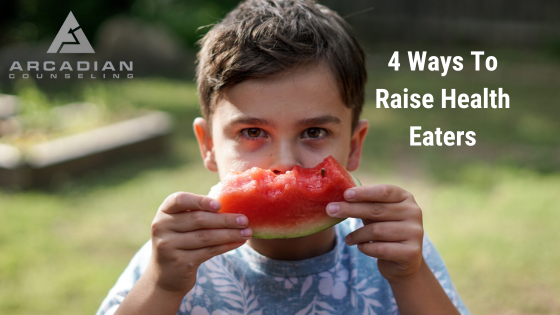Hopefully you know that good nutrition is important for your child’s physical health and development. But did you know raising healthy eaters is also critical for their mental health as well? Unhealthy diets in early childhood can lead to deficiencies in essential vitamins and nutrients – such as vitamin A deficiency, which weakens children’s immunity.
Healthy eating in childhood provides numerous health benefits such as consistent and stable energy, strong bones and teeth, preventing chronic illness, and maintaining a healthy weight.
4 tips for raising healthy eaters
1. Feed Your Kids Whole Foods – Not Processed
As much as possible, try to serve your kids fresh foods free of preservatives, additives, and excess sugar or artificial sugars like high fructose corn syrup (one of the worst things you can consume). This means you need to start by reading labels.
For instance, your child like many others, may want to eat peanut butter sandwiches for lunch every day. But most commercial peanut butter is typically include added preservatives and excessive amounts of additional sugar. Look for the peanut butter made only from fresh peanuts with no additives. A huge bonus is that it tastes way better!
2. The Day Starts With a Healthy Breakfast
Starting your child’s day with a healthy breakfast high in protein and whole grains and low in sugar will set them up for a great day filled with learning and all the necessary energy for physical activity. While it’s hard to get the family together for breakfast, sitting down with them is a great way to get them to gobble up their eggs instead of lamenting over the bowl of sugary cereal they can’t have. Plus, this morning time is a great opportunity to talk with them about what’s on their minds for the day ahead.
3. Essential Omega Fatty Acids

Raising healthy eaters involves making sure they get enough Omega fatty acids
Studies suggest that supplementing kids diets with omega-3 and omega-6 acids can help improve problem behaviors in children and adolescents who struggle with ADHD. Omega-3 acids can be found in fatty fish such as salmon, mackerel and tuna, as well as from walnuts and flaxseeds. Other nuts such as cashews and almonds. One great way to do this is to substitute almond butter for peanut butter as it contains omega-6 as well as omega-3. You could try a classic tunafish sandwich for lunches and sprinkle chopped nuts into oatmeal in the morning.
4. Let Your Kids Help Prepare Meals

You can’t raise healthy eaters if you don’t teach them how to prepare healthy meals.
People who prepare fresh meals made from whole foods tend to be healthier than individuals who eat primarily packaged foods. It’s important to teach kids early that taking a little time to prepare a meal (instead of microwaving a frozen dinner) will lead to a happier and healthier life. Additionally, this is a perfect opportunity to practice and implement mindfulness skills and techniques because preparing food can be a very mindful and meditative activity.
Kids love to help in the kitchen, so invite your little ones to help prepare family meals. Show them how quick and easy it can be to create a healthy dinner. This is a great opportunity for quality family time together and questions about what’s going on in their lives.
Good nutrition goes along way in helping children deal with and overcome mental health challenges such as ADHD, anxiety, and more! If you’re struggling with managing the challenges of parenthood, find an awesome therapist you like and trust to help.
James Killian, LPC is the Principal Therapist & Owner of Arcadian Counseling in Greater New Haven, CT where they specialize in helping over-thinkers, high achievers, and perfectionists reduce stress, increase fulfillment and enhance performance so they can move From Surviving To Thriving.



